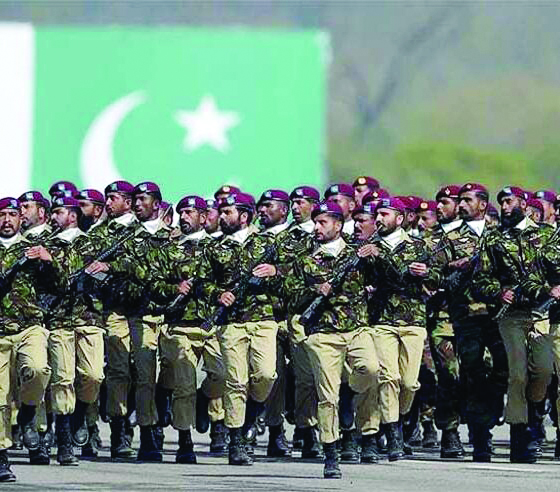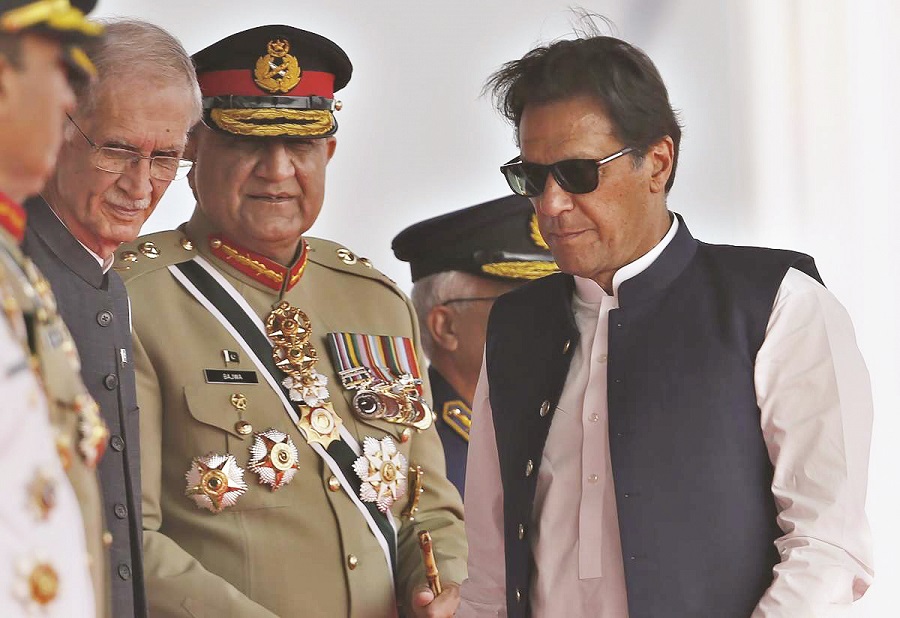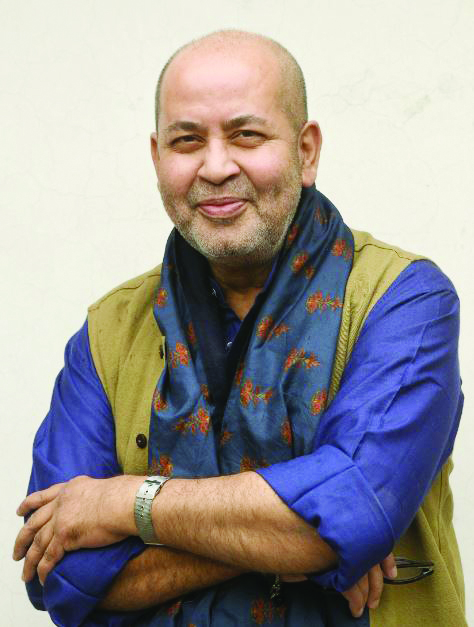The army has tightened its grip on Pakistan’s politics by passing two controversial bills that give it more power and immunity. The bills, which became law without the President’s approval, punish anyone who criticises or defames the army, discloses sensitive information, or creates public disorder. The opposition parties and human rights groups have criticised the bills as draconian and a threat to democracy
By Pranay Sharma
- Pakistan’s history is replete with examples where army chiefs brought in by prime ministers, have been the cause for their ouster from power
- The army has succeeded in establishing its primacy in Pakistan. a senator from Baluchistan, Anwarul Haq Kakar as the PM of the caretaker government
- talks may resume after parliamentary elections in India and Pakistan. If Nawaz Sharif becomes the PM the possibility of a dialogue will brightens
- Army Act Bill says any person or retired army officer defaming the army or spreading hatred will also be punished with two years’ imprisonment
AN unprecedented crisis erupted on August 20, 2023 in Pakistan, taking most people by surprise. Arif Alvi, the country’s President claimed, two bills that became law recently, were not approved by him as the constitution demands.
The Official Secrets (Amendment) Bill, 2023 and the Army Act (Amendment) Bill 2023 widens the scope of the army to respond to activities that defame or threaten it. They were passed in parliament after debate and sent to the President for approval.
Alvi said he did not sign the bills and had asked his office to return them since he had serious reservations about the legislation. But later found that his office defied him by not returning the Bills.
Though it sparked off a debate within the political and legal circles of Pakistan, the army-backed caretaker government pointed out that if the President neither approves or rejects a bill within a 10-day timeframe, it automatically assumes the status of law. There was no third option for the President.
Control of Army
Notwithstanding the latest controversy, turning the bills into law is being seen as the army’s attempt to consolidate its power. For a brief period, there was confusion whether the army’s grip on Pakistan was weakening as former Prime Minister Imran Khan’s relentless campaign against the military establishment appeared to be gaining popular support.
But through a series of recent measures, the army has succeeded in establishing its primacy in Pakistan’s political structure. Earlier in the month, it appointed a lesser-known Senator from Baluchistan, Anwarul Haq Kakar as the Prime Minister of the caretaker government.
This came at a time when there were intense discussions between the Pakistan Muslim League (Nawaz) and the Pakistan People’s Party—the two main political parties of the PDM coalition– to bring a politician close to them as head of the caretaker government to oversee the forthcoming parliamentary elections.
But by appointing Kakar, the army has left its stamp on a very important issue before the elections.
Anwarul Haq Kakar had co-founded the Baluchistan Awami Party (BAP) in 2018 with the support of the army. The same year he was elected to a seat from Baluchistan to the Senate.
There is apprehension among political parties that the caretaker government may stay longer than the stipulated 90 days by when elections should be held and run the administration under the army’s guidance beyond that date.
Controversial Bills
Recently, the Chief Election Commission (CEC) also ignored the President’s suggestion for a meeting to decide on the date for the parliamentary election. The CEC has made it clear since an amendment to the earlier act, it was not mandatory for it to consult the President while finalising the date of the election.
Under rising criticism about his inability to control the President’s office, Alvi decided to dismiss his top secretary. But the official has denied having received any instruction from the President on returning the controversial bills that further empowered the army. It is clear that allowing the bills to turn into law were part of the measures being taken by the army to insulate itself from future attacks from the civilian leadership.

Ironically, the civilian leadership also played an active role in getting them passed in parliament. The President too, is believed to have played his part in turning them into Acts.
The Official Secrets (Amendment) Bill will find a person guilty of an offence if he creates a problem of public order or acts against the state. It also says that if a person attacks or damages a prohibited place and it directly or indirectly benefits the enemy, then it will also be punishable
The Official Secrets (Amendment) Bill will find a person guilty of an offence if he creates a problem of public order or acts against the state. It also says that if a person attacks or damages a prohibited place and it directly or indirectly benefits the enemy, then it will also be punishable.
Under its provisions, unauthorised disclosure of identities of intelligence agencies, informants or sources is a punishable offence of three years in jail and a fine of Pakistani Rs 10 million. The Army Act (Amendment) Bill says any person or retired army officer defaming the army or spreading hatred against it in public or on digital or social media will also be punished with two years’ imprisonment. It also prevents military personnel from engaging in political activities within two years of retirement.
The new law while strengthening the military establishment actually allows the current army chief Asif Munir to consolidate his position over the other army officers.
At one level it ensures there is no rebellion in the ranks in future. On the other hand, it makes his subordinates and the other generals personally loyal to him.
Imran Khan’s Ouster
Imran Khan is currently in jail on corruption charges serving a three-year sentence. He has also been barred from political activities and therefore, cannot take part in elections for five years.
Until recently, he was relentless in his campaign against the army and holding it responsible for his ouster from power and losing the trust vote in parliament in April 2022.
Imran had also alleged that he was removed from power by the army at the behest of the United States since he was critical of American policies and their adverse effect on Pakistan.
A day before the controversy broke out over the bills, the former foreign minister and a close aide of Imran, Shah Mehmood Qureshi, was arrested in connection with a charge against the former Prime Minister under the Official Secrets Act.
The police registered the case after American news outlet ‘The Intercept’ published a diplomatic cable that had gone missing from Imran’s possession. Alvi, was a senior leader of the PTI before he became President. Many believe that he is now attempting a U-turn on the bills in the face of mounting criticism from his erstwhile party colleagues.

Attempts have been made in recent months by changing existing laws to get Nawaz Sharif back in the country. The PMLN wants to project him as the next Prime Minister to revive his popularity among voters and counter whatever influence Imran Khan may still have in Punjab
However, Imran remained a popular leader even after dismissal. His rallies drew large crowds, especially youths, and his diatribe against the army found wide appreciation among the people.
It was said that Imran enjoyed support and sympathy also among sections of the armed forces and their families. But on May 9, Imran overstepped.
His PTI supporters went on a rampage after Imran was arrested by the security forces from a court premise when he appeared before the magistrate.
An earlier attempt by security forces to arrest Imran from his residence was thwarted by a group of militant PTI supporters who attacked the security forces when they tried to enter the building.
Violence and Vandalism
The countrywide protests in the wake of his arrest, led to large scale violence and vandalism as his supporters resorted to damaging property and vehicles in different cities demanding his release.
The protesters also attacked military installations and residences of army commanders. This was unprecedented, as street protests in Pakistan have kept away from targeting the army.
The army generals realised they had to act and take control of the situation to stop the situation from deteriorating further. As the rioting and violence against army installations became known to the wider public, Imran began to lose support from those who had earlier sympathised with him.
The army found the opportunity to go after Imran and in subsequent weeks managed to systematically dismantle the PTI. Large number of senior leaders of the party who were arrested by the security forces dissociated from the Imran-encouraged protests. While several others, decided to retire from politics.
The army also acted against senior generals, brigadiers and their families who sympathised with Imran.
Nawaz Sharif’s Resurgence
It also enlisted the Shehbaz Sharif-led PDM coalition government’s support in acting against the PTI chairman to indicate that the civilian leadership was on the same page with the army.
In the following days the generals came up with a “minus-Imran” strategy to marginalise Imran and ensure he couldn’t participate in the forthcoming parliamentary elections.
The controversial bills passed in parliament to strengthen the army against attacks from civilian leadership, came under this backdrop. Sadly, the civilian leaders have decided to allow the army to put the noose around their neck in future.
An attempt is on to bring back Nawaz Sharif to Pakistan before the parliamentary election.
Nawaz, a three-time Prime Minister and the top leader of the Pakistan Muslim League Nawaz party, is also popular in Punjab, the country’s most populous province. Fifty percent of the seats in parliament are also from Punjab and that makes it politically the most important province in the country.

One of the reasons why Bajwa was disappointed with Imran Khan was because he failed to charm Washington and put US-Pakistan relations back on track. The bilateral relations between the two countries suffered because of Pakistan’s duplicity in Afghanistan where it backed the Taliban against the American coalition that finally led to the “US troops” a humiliating withdrawal from the war-torn country without any achievable gains
In 2017 Nawaz was dismissed on corruption charges while still in power and subsequently, jailed and barred from contesting future elections. He was removed because he had begun to assert himself on important issues like normalising relations with India without consulting the army.
The then army chief Qamar Javed Bajwa replaced him by projecting the Oxford-educated Imran and a cricketing icon with a clean image.
Nawaz was subsequently allowed to go to London for medical treatment in 2019. He has since been there on self-exile.
Attempts have been made in recent months by changing existing laws to get Nawaz back in the country. The PMLN wants to project him as the next Prime Minister to revive his popularity among voters and counter whatever influence Imran Khan may still have in Punjab.
Relations With The US & India
One of the reasons why Bajwa was disappointed with Imran was because he failed to charm Washington and put US-Pakistan relations back on track. The bilateral relations between the two countries suffered because of Pakistan’s duplicity in Afghanistan where it backed the Taliban against the American coalition that finally led to the “US troops” a humiliating withdrawal from the war-torn country without any achievable gains.
Pakistan’s growing dependence on China, a country that the US sees as posing it an existential threat and challenging its global hegemony, was a more serious reason for Washington to ignore Islamabad in recent years.
Thus Imran’s political rhetoric had only made it worse. However, the generals in Pakistan are seriously worried about the growing closeness between India and the US.
As Munir consolidates his position further through a series of measures, he faces two challenges. One has to do with Nawaz Sharif.
Despite the changes that were brought in the law to ensure his return and contest the election, the Pakistani Supreme Court has intervened. A three-judge bench, headed by the Chief Justice Umar Ata Bandial has struck them down as “null and void” and “ultra vires to the Constitution.”
Therefore, according to the apex court the new laws have “no legal effect.”
Munir was removed from the Pakistani spy network the Inter-Services-Intelligence (ISI) director-general’s post when he had barely completed eight months in the job by Imran khan when he was Prime Minister in 2019.
The Sharifs have appointed Munir as the Pakistan army chief. But even if he facilitates Nawaz’s return and allows him to be the next Prime Minister there is no guarantee that they will have an amicable and cooperative relationship in future.
Pakistan’s history is replete with examples where army chiefs brought in by prime ministers over the head of other senior generals, have been the cause for their ouster from power.
More important challenge for Munir will be on future relations with India.
Sharif has been keen on normalising India-Pakistan ties and making it more cooperative and beneficial for both countries while he has been in the prime minister’s post.
Uncertainty in the Future
Under Imran, Pakistan came out with its first national security policy where economic security was listed as its top security even as it continues to emphasise military security.
Observers felt that this came after suffering chronic financial ill-health and regular bail outs from the International Monetary Fund (IMF).
Since 1950 Pakistan has been bailed out by the IMF 22 times including one in November 2021 with a loan of US$ 6 billion. In December last year the World Bank also gave it a loan of US$ 195 million to improve its electricity distribution.

Nawaz Sharif, a three-time Prime Minister and the top leader of the Pakistan Muslim League Nawaz party, is also popular in Punjab, the country’s most populous province. Fifty percent of the seats in parliament are also from Punjab and that makes it politically the most important province in the country
The policy focused on seeking peace with its neighbours and exploring opportunities to make Pakistan a trade and investment hub.
However, experts pointed out that there was an inherent dichotomy in Pakistan’s strategy of pursuing a geo-economic strategy to regional trade, particularly with India while also pushing an adversarial relation with it.
Pakistan continues to be regarded as its main source of threat.
India is not only the largest country but also the largest market in South Asia. But it is odd and unrealistic for Pakistan to expect New Delhi’s participation and support in its endeavour if it continues to be hostile to India.
It has often been argued by India that while Pakistan is fighting terror groups like the TPP, it has not taken any credible action against terrorists like Hafiz Saeed or Masood Azhar who have a proven record of carrying out several terror attacks in India.
Under international pressure they have been removed from the limelight but New Delhi contends that they are still being sheltered by Pakistanis and can be used against India in future.
But formal dialogue at the top level of leadership between the two countries has not taken place since Prime minister Narendra Modi’s impromptu visit to Lahore in December 2015.
There is a possibility that talks may resume after parliamentary elections are completed in both countries. If Nawaz Sharif becomes the Prime Minister the possibility of a dialogue between the two prime ministers brightens.
But with an army trying to consolidate its power over the civilian leadership in the country, it will be too optimistic to expect a relationship where cross-border-terrorism will be treated as a thing of the past in India-Pakistan bilateral ties.
